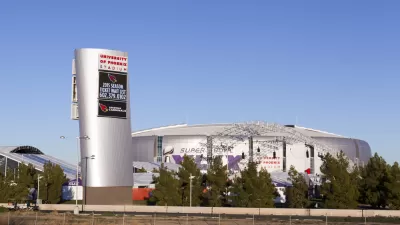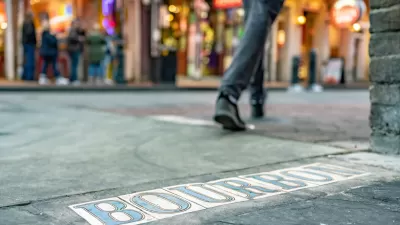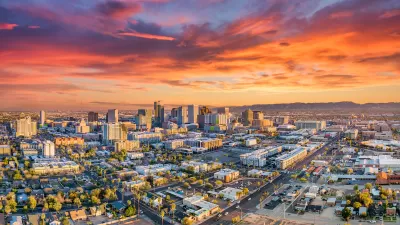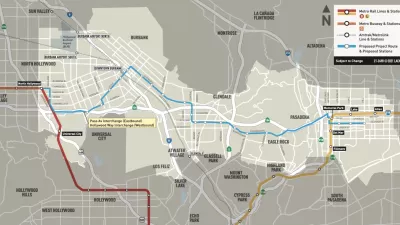Mark Byrnes breaks down the math on this year's Super Bowl and finds the host city of Glendale, Arizona getting shortchanged.

Mark Byrnes balances the checkbook on the city of Glendale, Arizona's investment in the University of Phoenix Stadium and finds that the city's interests fall wall short of the NFL's.
First of all the cost to the taxpayers of the city and the state: "$302.3 million from the Arizona Sports and Tourism Authority and $9.5 million from the City of Glendale to build the stadium. (The team contributed $143.2 million.)"
Then this weekend, "the Phoenix suburb is expecting to spend $2.1 million on security for Super Bowl week."
Then there's the revenue expected to return to the city as a result of this weekend's hoopla: "PricewaterhouseCoopers estimates $206 million in direct spending (tourism, lodging and transportation) will flow into the metro area as a result of this year's Super Bowl, but adds that after inflation the figure is two percent lower than projected for Glendale's first Super Bowl, back in 2008. For that event, the city of Glendale collected approximately $1.24 million in direct revenue and state shared sales taxes."
Which, Byrnes concludes, is "not an especially exciting bottom line considering more than 40 percent of Glendale's current debt 'is dedicated to paying off sports complexes,' as reported in the New York Times last weekend."
The article includes more details on how the NFL makes the case for new stadium investments and how localities get the short end of the stick, including the example of East Rutherford, New Jersey, which hosted the event in 2014.
FULL STORY: The Burden of Hosting a Super Bowl

Planetizen Federal Action Tracker
A weekly monitor of how Trump’s orders and actions are impacting planners and planning in America.

Maui's Vacation Rental Debate Turns Ugly
Verbal attacks, misinformation campaigns and fistfights plague a high-stakes debate to convert thousands of vacation rentals into long-term housing.

Restaurant Patios Were a Pandemic Win — Why Were They so Hard to Keep?
Social distancing requirements and changes in travel patterns prompted cities to pilot new uses for street and sidewalk space. Then it got complicated.

In California Battle of Housing vs. Environment, Housing Just Won
A new state law significantly limits the power of CEQA, an environmental review law that served as a powerful tool for blocking new development.

Boulder Eliminates Parking Minimums Citywide
Officials estimate the cost of building a single underground parking space at up to $100,000.

Orange County, Florida Adopts Largest US “Sprawl Repair” Code
The ‘Orange Code’ seeks to rectify decades of sprawl-inducing, car-oriented development.
Urban Design for Planners 1: Software Tools
This six-course series explores essential urban design concepts using open source software and equips planners with the tools they need to participate fully in the urban design process.
Planning for Universal Design
Learn the tools for implementing Universal Design in planning regulations.
Heyer Gruel & Associates PA
JM Goldson LLC
Custer County Colorado
City of Camden Redevelopment Agency
City of Astoria
Transportation Research & Education Center (TREC) at Portland State University
Jefferson Parish Government
Camden Redevelopment Agency
City of Claremont





























